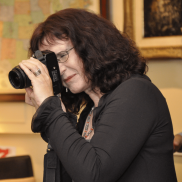Margo Wixsom: Teaching Art for Change


Margo Wixsom, an art teacher at Palo Alto High School in California, was a participant in the Memorial Library’s 2011 Summer Seminar. The first art teacher accepted into the program, she brought a refreshing new perspective to the seminar’s collaborative study of the Holocaust. The experience continues to influence her pedagogical approach and to have direct impact on her curriculum.
In 2009, Margo attended the Stanford Program for Interactive Cross-Cultural Education, focusing on Southeast Asia as well as the study of eugenics. The program inspired her to organize a class photography project that countered racial stereotypes head on. Students found pictures and phrases that perpetuated bias against their individual ethnographic, racial or religious groups, then created large-scale self-portraits with powerful written reflections expressing their responses to those negative images.
When Margo heard about the Library’s Holocaust Educators Network from a colleague, she saw the chance to continue her exploration of bigotry and its consequences by expanding her knowledge of the Holocaust. She was, in particular, eager to relate on a personal level to the broader cultural and historical background of her large Jewish student population. “I knew about that traumatic period, but I needed to learn more,” she admits.
Of the two-week summer seminar in New York, Margo recalls that it was “like winning the lottery for an educator.” Still, she was daunted initially by the challenge of conveying the vastness of the tragedy to her students back home while emphasizing the importance of tolerance in today’s world. The vision for her post-seminar project came to her as she walked through an exhibit on graphic design and Nazi propaganda at the US Holocaust Memorial Museum in Washington, DC, which she visited before returning to California.
Most of her photography students at that time were freshmen, new to the study of European history. With a Mini-Grant from the Memorial Library, Margo introduced them to the concept of propaganda, using it is as a vehicle for contextualizing the Holocaust, and helped them identify the subtler social bigotry present in modern-day society.
Her students selected images that reflected a stereotype and conceived a phrase to counter it. Using cyanotype, a photographic technique, they framed these images on salvaged windows and crafted a 9’ x 18’ banner, creating a record of the Holocaust’s global impact while inspiring respect for diversity. The images composed an exhibit entitled Picturing Tolerance/Intolerance (www.picturingtolerance.tumblr.com) displayed at the school. An opening ceremony was part of the 2012 US Holocaust Memorial Museum’s National Days of Remembrance.
Though school was Margo’s haven growing up in Rochester, New York, the idea of becoming an educator herself came later, almost by chance, while raising her own children. She has Master’s degrees in both English and art, but it was in the classroom that she found her calling. Over the years, she has taught subjects as varied as ESL, design, photography, and environmental studies, from middle school to the college level. Her pedagogical approach is to create project-based, real world experiences for her students, enabling them to grow as individuals and community members who use the power of art to affect social change.
Margo is currently working with several of her students as they prepare submissions to the Scholastic Arts & Writing Awards/The Gedenk Award for Tolerance. One of her students won last year’s visual arts competition and attended the 2014 awards ceremony at Carnegie Hall in May.
Margo is also embarking on a co-venture with an English teacher at Palo Alto High School, timed for completion around the National Days of Remembrance in the spring. They worked together before, when Margo photographed the survivors her colleague invited to speak to her literature classes. Students will create and display Tibetan-inspired prayer banners using cyanotype, featuring a fact about the Holocaust on one side and on the other, an idea that nurtures tolerance.
“The banners will be visually striking, and they will teach our students the powerful message that words matter very much,” Margo says.
